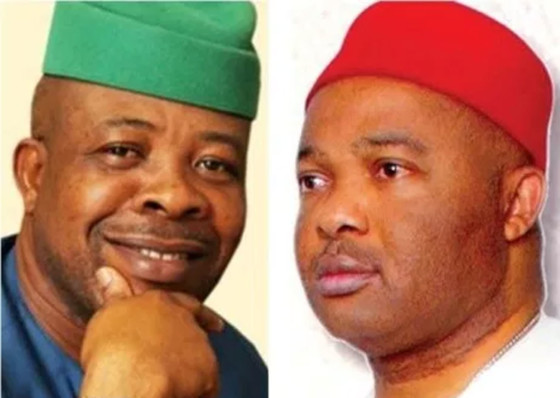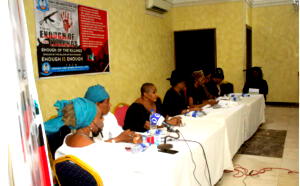Ihedioha-Uzodinma By Douglas Anele Continuing from where we ended last week: every Imo indigene I have spoken to disagrees with the Supr...

By Douglas Anele
Continuing from where we ended last week: every Imo indigene I have spoken to disagrees with the Supreme Court’s judgement, and most of them even insist that replacement of Emeka Ihedioha with Hope Uzodinma is a huge step backward.
Few sounded a note of caution by stating that, despite some of the promising actions by Ihedioha, it is too early to be cocksure about how he would perform in the long run. Now, concerning the highly controversial Supreme Court judgment that kicked Ihedioha out of office, certain pertinent questions automatically leap into bold relief that require careful consideration especially by Imo State indigenes like me who are sick and tired of mediocre leadership that has been recurrent in the state like a devious ogbanje.
First, why did the apex court summarily dismiss the counterarguments of Ihedioha’s legal team against according probative value to the questionable results presented before it by the petitioner?
Why did the court accept completely Uzodinma’s petition by abandoning established principles of law regarding the admissibility and evidential value to be accorded to documents tendered from the Bar in election matters which it applied last year in respect of the Ekiti governorship election and in the case involving Alhaji Atiku Abubakar and INEC? In other words, how come Tanko Mohammed and his colleagues accorded probative value to result sheets riddled with mathematical anomalies presented by a witness who did not make the documents in the first place?
As a corollary, what is the justification by the apex court for ignoring the obvious flaws in the documents noted by the respondent’s attorneys which necessitated dismissal of Uzodinma’s petitions at both the election tribunal and Appeal Court? Some critics of the Supreme Court’s judgment argue that the election results tendered by the petitioners’ witnesses are fatally flawed in there major respects, namely, fictitious polling units, over-voting and total number of votes allocated only to the All Progressives Congress (APC) and Peoples Democratic Party (PDP).
On the issue of fictitious or non-existent polling units, there is the case in Nwangele Local Government Area (LGA) where a polling unit designated as Umuanu Community Secondary School, Umuanu II, was found to be non-existent. In this fake polling unit, the total number of votes cast was stated as 435. Of these, APC got 411, PDP 11, while other parties that contested got none.
The remaining votes were unaccounted for by the so-called Certified True Copy (CTC). On over-voting, a critical look at the duplicate forms EC8A brought forward by prosecution witness 54, deputy commissioner of police Rabiu Hussein, reveals no fewer than six polling units where the number of votes recorded was greater than registered voters.
Consider the entry for polling unit 384 in Umunkwo ward, namely, Community Primary School, Umuokpara. Here the total number of votes cast was 526. APC secured 526 votes and PDP 2, making a total of 528 votes as against 526 votes cast. A more brazen instantiation of over-voting occurred in Eziama Okpala where the total number of votes cast was 462.
The result presented and admitted by the apex court from the petitioner showed that APC had 819 votes whereas PDP got 7 votes, making a total of 826, almost double the number of votes cast. If one considers the fact that the total number of accredited voters by INEC would likely have been significantly lower, since the number of registered voters for each polling unit is pegged by law at 500, the figures in the result sheets are unrealistic.
READ ALSO: Ihedioha Vs Uzodinma: Full text of Supreme Court’s judgement
Again, on page 22 of Uzodinma’s petition which contains results from polling unit 282, the registered voters were 591. But in the accompanying table, APC polled 586 and PDP 9, totalling 4 votes more than the total registered voters. These figures do not include votes allegedly polled by other parties. The same is true of polling unit 285 with 449 registered voters: APC got 780 and PDP 4, making a total of 784, 335 votes more than the total number of purported registered voters.
Another bizarre surprise is this: results from the disputed 388 polling units had scores mostly for the APC and PDP and none for other parties that contested the election. The question now is: what is the possibility that the remaining parties did not get few votes at least from their polling agents and ward officers? The conclusion from the information presented thus far is clear and unequivocal.
If the result sheets published in various media are really the ones Rabiu Hussein brought forward in sacks and bags, it is absurd for any court to entertain them seriously and use same as basis for upturning results certified by INEC, the only body authorised by law to conduct elections and declare the winners and losers. We have already noted that in treating the result sheets submitted by the prosecution witness, the Supreme Court actually jettisoned the precedence it had established in similar cases before; it even ignored the cross-petition of Ihedioha’s legal team against the admissibility of those very results.
The figures INEC released showed that accredited voters were 823,743; total votes cast amounted to 739, 485; valid votes were 714,355, which means that 25,130 votes were rejected. Now, the apex court added 236,600 INEC-rejected votes to Uzodinma, bringing his total to 333,058 votes, which pushed the total votes cast from 823,743 to 950,952, an increase of 127,209 from the number of INEC-accredited voters. Interestingly, only the votes for APC increased dramatically; the ones for PDP very marginally, while others remained unchanged.
Any reasonable person with elementary knowledge of arithmetic or statistics knows that, based on the woeful performance of the APC in the state assembly election held the same day as the governorship, the probability of the result awarded to Uzodinma by the Supreme Court being an accurate reflection of actual votes cast is vanishingly small, in fact close to zero. Yet, Kudirat Kekere-Ekun and her colleagues audaciously waved aside obvious mathematical and factual inconsistencies to declare Uzodinma governor of my home state.
The constitution of the panel that adjudicated on the matter raises eyebrows as well. Aside from the sudden announcement that one of the justices, John Inyang, had suddenly taken ill necessitating postponement of sitting to the following day, some commentators argue that the selection of Sylvester Ngwuta was deliberate because he would likely decide in a manner that aligns with the interest of the cabal in the executive that has been working assiduously to undermine the independence of the judiciary and also break PDP’s dominance in Igbo heartland.
Remember, Ngwuta was one of the high-ranking judicial officers humiliated at home last year by operatives of the Department of State Services (DSS). This is the first time he is sitting on such a panel since his ordeal.
Another member of the group, Aminu Sanusi, was recused from another election panel on December 17, 2019 because of his impending retirement. But he was among the justices that heard Uzodinma’s petition. Thus, it appears that Chief Justice Tanko Muhammad was cherry-picking justices who would dance to the music played by the leviathans in Abuja.
The argument that Emeka Ihedioha’s lawyers messed up his case at the Supreme Court does not hold water given that the justices deliberately ignored both the counterarguments of the respondents and precedents in similar decided cases by the court itself. This being the case, there are enough grounds for suspicion that Tanko Muhammad and his colleagues were working towards a predetermined outcome.
From a superficial or myopic point of view, the puzzling judgment is simply the legal settlement of a political contest between Ihedioha and Uzodinma.
The post Imo: Where are the philosopher-kings?(3) appeared first on Vanguard News.

No comments